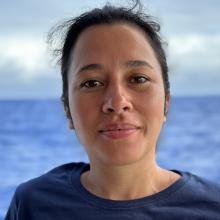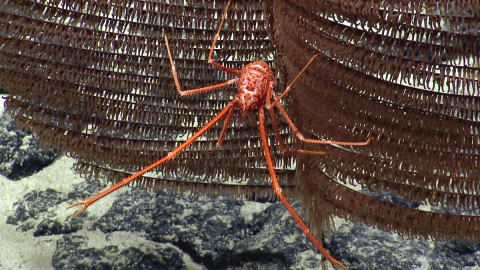
Raissa Hogan
Tell us about your work/research. What kinds of things do you do?
I am deeply intrigued by the evolution of marine species through time and space. Using molecular data and taxonomy as the foundation, I explore marine biodiversity, study the relationships between different groups of marine organisms, and investigate their distribution across vast ocean expanses. To tackle complex questions, I integrate various disciplines, such as oceanography, geology, life history, and ecology into my research. This multidisciplinary approach allows me to gain a more comprehensive understanding of how marine species have evolved and adapted. In the past decade, I have developed a profound interest in deep-sea corals, mainly sea pens and black corals, which have become the primary focus of my research. These colonial animals represent one of the oldest clades of organisms. To study them, I embark on research vessels, often equipped with ROVs, to collect high-quality data directly from their natural habitats. Additionally, I visit museums to access valuable collections. In the laboratory, I sequence parts of their DNA and meticulously describe their morphology.
What sparked your initial interest in your career?
It was the allure of the unknown and the endless possibilities the sea held, that ignited my wild imagination. Being part of the natural world fascinated me, especially when visiting the sea! As a child, I recall going to the sea with my siblings, where we shared a profound love for its wonders. Collecting shells became my favorite pastime, and I meticulously arranged them by color, size, and pattern, revealing my budding taxonomist tendencies. My sister, who is about 10 years older, played a significant role in my passion for the ocean. She taught me how to dive, and I would watch in awe as she disappeared into the deeper waters, imagining the fantastic marine creatures she must be seeing. Anxiously waiting for her return, I would eagerly listen to her exploration stories. I longed to join her, but she used to say I was too small. She promised that when I grew up, I could explore the entire ocean. Now, here I am, fulfilling my lifelong dream.
Who influenced you or encouraged you the most?
It is a difficult question for me, as throughout my journey and at each stage, I have encountered several amazing individuals who have had a significant impact on my decisions and career. From my family and friends to each of my teachers and mentors, they have all played a crucial role in shaping my path. However, I must say that most recently, I have been hugely inspired by Dr Andrea Quattrini, Professor Cathy McFadden, and Dr Gary Williams.
What element of your work/study do you think is the most fascinating?
The most fascinating thing is the incredible opportunity to witness, in real-time HD images, parts of our planet that lie thousands of meters deep under the sea - places that have never been seen before, where immense pressure, total darkness, and extreme cold prevail. The possibility of gaining a deeper understanding of our planet's vastest habitat, studying millennia-old corals, and sharing all of this with the entire world is truly amazing.
What other jobs led you to your current career?
I started studying ecology and conservation of marine animals, such as sea birds and sea turtles. As I delved deeper into my studies, my questions began to encompass a different scale of time and space. During my master's program, I had the opportunity to take modules on genetics and evolution, and immediately I knew that I wanted to pursue that direction. Consequently, my thesis focused on the evolutionary history of coral-reef fish communities in the Indo-Pacific, which was an incredible opportunity.
Once again, my curiosity led me to explore further, and during my PhD, I had the chance to work with deep-sea corals. This experience captivated me and had since become my primary research interest.
What are your degrees and certifications?
- Bachelor of Science in Oceanography, Federal University of Rio Grande, Brazil, 2006 - Cinematography, Ballyfermot College of Further Education, Ireland, 2010 - Erasmus Mundus
- Master of Science in Marine Biodiversity and Conservation (EMBC): Ghent University (Belgium), University Pierre et Marie Curie Paris VI (France), and IRD (France), 2012
- PhD in Zoology, University of Galway, Ireland, 2023 (Expected)
Outdoor Skills Training: - Mountain Skills Training level 1 and 2, Mountaineering Ireland, Ireland, 2014 - Wilderness First Aid, Remote Medicine Ireland, Ireland, 2013 - Basic and Advanced Bushcraft Course, Institute for Permaculture and Nature Awareness (IPNA), Ireland, 2012
Additional Training: - Training Course of Scientific Observers, National Plan of Action for the Conservation of Albatrosses and Petrels (NPOA-Seabirds Brazil), 2006 - Herbal Medicine, Dr Clare's Academy, Ireland, 2019
What are your hobbies?
I love cooking, eating, and sharing delicious food with friends. I enjoy gardening, hillwalking, capoeira, and sea swimming. I also have a passion for music, and I am currently learning to play cello.
How did you get involved with the Nautilus Exploration Program?
During my PhD, I had the opportunity to participate in several deep-sea expeditions using ROVs, where I specialized in studying deep-sea corals. Additionally, I served as a trustee in the Deep-sea Biology Society, which allowed me to expand my network. Through a collaborative partnership between Ocean Census and Ocean Exploration Trust, I was invited to be part of the scientific team as an evolutionary taxonomist, which is a great honor for me.
What advice would you give someone who wants to have a career like yours?
I understand that each person has a unique path, which can come with both privileges and disadvantages. This realization can serve as a starting point for developing strategies to reach your goals. So, here, I would offer some general advice.
Firstly, believe! Believe in yourself! Embrace the idea that anything is possible with dedication. Discover what truly ignites your curiosity and passion, as this will drive your journey. Additionally, one of the most important principles to me is being 100% committed in everything you do – with yourself, the people around you, and your work and dreams. To have a career in deep-sea exploration, we must be part of a team, which is a privilege that allows us to exchange a significant amount of knowledge. It is crucial to develop a sense of collaboration and rethink how to contribute to each project and situation.
Expeditions
Raissa participated in the following Ocean Exploration Trust expeditions:

